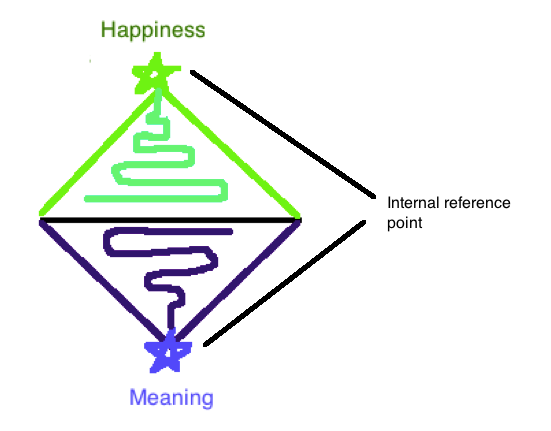I. So I have to admit— I was one of those people who Googled “end of the world” last week. Even after a week of open discourse, I think we are all imagining different futures for the next four years; our collective imagination seems to be disjointed into different wavelengths. Now, think about this: imagine a world with mirrors that showed you a another person’s true feelings, a bed that got you ready for work, a potion you took to recharge yourself with certain emotions, portable holographs, dream catchers, and more. These were all ideas that HJA members mentioned last week when I asked them to come up with a creative object that they would want in the future during my Spirituality spotlight. We all created a shared collage of objects that would make our lives “easier”, more meaningful, and readily influenced by technology. All our hopes and ideals for the future, including better communication and increased efficiency still exist, but we have to consider them in new contexts. The election happened just last week, so there hasn’t been that much time to process it, but I’ve just been trying to listen to all my friends’ thoughts (s/o to Trishya). Nevertheless, I think that most haven’t come at it from a spiritual angle. I think that spirituality offers another lens into what it means to be happy or find meaning in a time of uncertainty. So, now begins the subject that I had originally planned on talking about.
II. I don’t know how many times you have heard “There is always something to be happy about” or how many people believe in it. But I would like to think that it is one of my life mottos. Yes, happiness can be two-dimensional: pleasure, which is transient (like eating a bar of chocolate, yum) or bliss, which is an ultimate goal. Thus, in difficult times, I think we need to draw on both measures of happiness, and recall what makes our happiness lasting. It’s easy to get off campus for a bit and then feel relieved, but then when you are back on campus you need to find something else to hold on to.
I had an image in mind that happiness was on a sliding scale or continuum where one should avoid extremes of being really sad or ecstatic and try to stick to the “middle” or a stable/healthy level. But Parth helped me come up with a better model where happiness is not “either, or” and you have a happiness plane where you start with a wide base (the small things that make you happy) and can narrow up to the tip or your internal reference point. What’s an internal reference point? (s/o to Sohum for introducing me to this) For everyone it’s a different standard of what will always make you happy – a standard that is based on your own values and not influenced by external factors or what others want of you. The inverted plane/triangle is a similar theory applied to finding meaning more often among smaller things, but also more significant things.
My bad, but colorful illustration:

So, back to whether you can always find something to be happy. I can’t really speak for other people, and there are several nuances. When you are so happy it’s hard to imagine being sad, but at the same time when you are sad it’s hard to imagine being happy about something. But at least for myself, maybe I have begun to understand my internal reference point, which includes coming to HJA meetings and knowing that I have an amazing community that I am a part of. I think when some of my close senior friends last year left, I realized how the people at Penn are the most valuable part of my experience.
III. I like thought experiments, so here’s some food for thought- what if you could just focus on one happy thing in your day- how long can you go without forgetting something that made you happy? There is a quote like “Can you stop to watch the shining stars instead of reaching out for them?” (s/o Manasvi)
How far can you push yourself to be happy if you are sad? Do you need friends to keep you grounded? Can we talk about what makes each other happy more often? I’m not sure I know what makes all my friends happy …I would love to take more time to do that. How open are we to talking about what makes us truly happy?
What if you have to create another imaginary world where you can find happiness if this current world isn’t giving it to you and then at some point try to merge those two worlds, perhaps through art? What if Mounika is actually crazy and you don’t understand anything she said?
IV. Lastly, my corny take-away as your prize for reading: Time is a non-renewable resource, but happiness is renewable. You can always go back to those points of internal reference that you have unconsciously created and defined for yourself.
Penned by Mounika Kannegati | College Class of 2017
